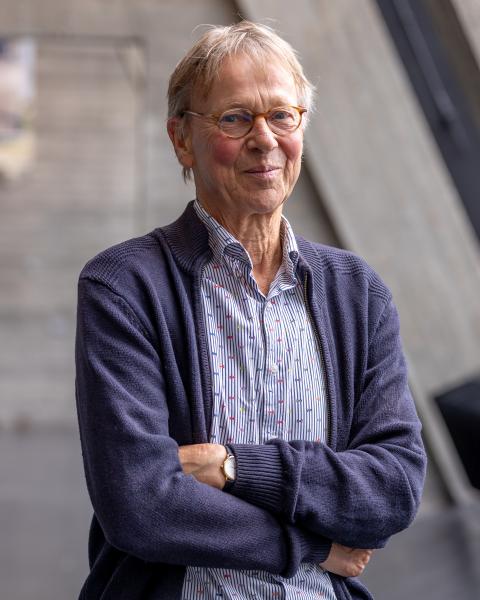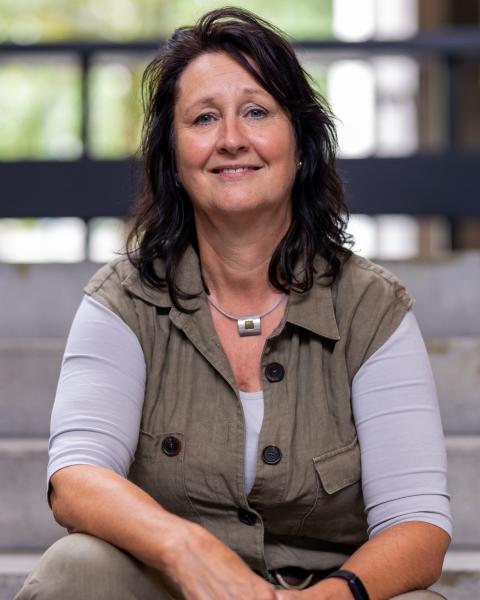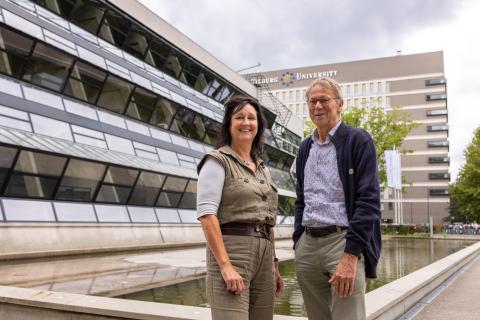Celebrating fifty years Language Center
Having been established in 1973, the Tilburg University Language Center celebrates its fiftieth anniversary this year. The Language Center annually helps about three thousand students and staff, as well as other interested parties from outside the university improve their command of a language or learn a completely new one. In the month of the Language Center’s fiftieth anniversary, the first supervisor of the Language Center and the incumbent director meet on the Tilburg University campus. Guust Meijers, the former coordinator of the Language Center, and Tjits Roselaar, the current director of the Language Center, talk about the Language Center’s past, present, and future.
It is a special meeting, with much reminiscing, sharing of experiences, and lots of laughter. And the vacancy that started it all for Guust is also briefly discussed.
How it all started
At the end of 1972, the Tilburg Catholic Academy (now Tilburg University) was looking to recruit a linguist to coordinate the establishment of a Language Center. Guust, now a retiree living in France, was studying in Paris when he saw the job opening. He was immediately interested, he says. “I had studied linguistics and French and wanted to develop in linguistics and language education. This job fit the bill exactly. I applied, was interviewed, and started in September 1973.”
It was a lot of pioneering in the beginning. “It was a new position and I was a rookie, young and inexperienced. Not an ideal position to tell five seasoned language instructors what to do. So it was not plain sailing by any means, at the beginning.”

Internationalization was an increasingly important spearhead. We received more and more international students in Tilburg and more of our own students went on exchange, boosting the demand for language courses.
Guust Meijers
A doubling of course offerings
This changed the moment the Language Center became part of the newly set up School of Arts. “As a result, we also had to teach courses like English and Dutch language proficiency. Moreover, I was appointed as head of the department, which gave me more leverage. Another important factor was that internationalization was an increasingly important spearhead. We received more and more international students in Tilburg and more of our own students went on exchange, boosting the demand for language courses. In a short time, our course offerings doubled and we recruited many new instructors.”
“By that time, we also had our very own language lab, you know, with those big tape recorders,” Guust remembers enthusiastically. The memory makes him smile. “Not a lot of people are familiar with them anymore but it was revolutionary technology at the time! Students themselves could record and listen to the tapes.”
A breath of fresh air
Tjits responds: “It was so different in 2011, Guust, when you retired after 38 years! By then, everything was done much more online,” she reminisces. “And things were much more professional. You left behind a Language Center that offered a wide variety of courses and more than twenty-five members of staff.” Tjits was already working at Tilburg University at the time: since 1992, first teaching Dutch as a foreign language and later as a coordinator of the Dutch section of the Language Center. She was also on the management team headed by Guust. Tjits smiles at the thought. “Yes, Guust and I go back a long time. He has achieved a lot and it was sad when he left.”
Two supervisors later, there is a breath of fresh air when, in 2013, Tjits herself becomes the director of the Language Center.

We cater to the existing demand among students and contribute to the university’s internationalization strategy
Tjits Roselaar
More than just language courses
Since 2013, the Language Center was greatly expanded, says Tjits. “We now offer language courses in ten languages and at different levels: Dutch, English, German, French, Spanish, Italian, Portuguese, Chinese, Korean, and Arabic. We cater to the existing demand among students and contribute to the university’s internationalization strategy. The team also continues to grow: we now employ about fifty language instructors and other staff.”
“Moreover, the Language Center now consists of five sections. Apart from Dutch, English, and Foreign Languages, there is the Scriptorium and the Language and Preparatory Program,” Tjits states with enthusiasm. “The Scriptorium is an academic writing center where we offer tailored tutoring to students in academic writing, literature search, and source referencing. With the Language and Preparatory Program, we help participants in civic integration programs prepare for academic studies in the Netherlands. So we do a lot more than just teaching language courses.”
Thousands of more proficient students every year
Even with all the changes, much has also remained the same. Guust: “In my time, the language courses were open to students, staff as well as highly educated people from outside the university. I think that hasn’t changed. The number of participants will probably have increased since then,” he adds with a wink. Tjits answers in the affirmative. “Every year, we have almost 2,500 students who take language courses, cashing in free language vouchers. In addition, many hundreds of participants from inside the university and beyond take contract courses, use the services of the Scriptorium, or participate in the Language and Preparatory Program.”

Ultimately, it is human communication that is crucial. And that is exactly what we as the Language Center stand for. That was true fifty years ago, it is true now, and it will be true in the future.
Tjits Roselaar
The secret of the Language Center’s success
What is the secret of the Language Center’s success? “I think the Language Center as an organization has always moved with the times, was ahead of its time in some ways, and has responded rapidly and flexibly to new developments,” Guust states. “But also within the organization: we gave people freedom and autonomy and fostered a good atmosphere. I have done my best to give the Language Center a bit of Schwung. We had a lot of laughs and a lot of fun working together.” Tjits totally agrees. “I think investing in the team is extremely important. Within the Language Center, we are committed to job satisfaction, talent development, and career opportunities. That also means that you train people, who then leave to take their next step. That is a pity, but it is also a positive thing.”
Language Center in fifty years’ time
What the Language Center will be like in fifty years’ time? Guust and Tjits don’t know. But both are convinced it will still exist. Tjits: “Communication has always been so important. Despite all these technological and online developments, people will always want to communicate with each other. Of course you can learn a language through an online course or an app like Duolingo, but it proves to be difficult in practice. Ultimately, it is human communication that is crucial. And that is exactly what we as the Language Center stand for. That was true fifty years ago, it is true now, and it will be true in the future.”
Date of publication: 25 October 2023



